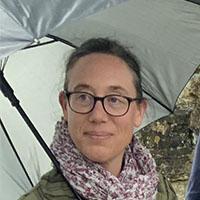Select your language
Select your language

2017. Habilitation à diriger des recherches. Titre du mémoire : Analyse et simulation de la concentration et de la dispersion des implantations humaines de l’échelle micro-locale à l’échelle régionale - Modèles multi-échelles et trans-échelles. Université de Franche-Comté (France).
2000. Doctorat de géographie. Titre de la thèse : Les localisations commerciales de détail en milieu urbain – Mieux connaître, par la modélisation, pour mieux aménager. Université de Franche-Comté (France).
Depuis septembre 2018. Directrice de recherche CNRS, Laboratoire ThéMA, Besançon.
Juillet 2015-Août 2018. Chargée de recherche, Laboratoire Chrono-Environnement, Besançon (France).
Octobre 2002-Juin 2015. Chargée de recherche, Laboratoire ThéMA, Besançon (France).
2012-2013. Mission de longue durée au Laboratoire Image, Ville, Environnement (LIVE ), Strasbourg (France).
2000-2002. Attachée temporaire d’enseignement et de recherche, Université Louis Pasteur, Strasbourg (France).
1999. Chargée de recherche, dans le cadre d’une convention entre la firme Daimler-Chrysler et l’Université de Franche-Comté.
1995. Chargée d’études au service Espaces Verts de la Ville de Besançon.
1992-1995 Cartographe à l’Association pour la cartographie et l’étude de la Franche-Comté.
1992 Chargée d’études au Conseil Régional de Franche-Comté.
Médaille de bronze du CNRS en 2006 (section 39 "Espaces, territoires, sociétés")
Prix "Connaissance pour la mobilité" (avec P. Frankhauser, H. Houot et G. Vuidel) en 2008, PREDIT (programme de recherche et d’innovation dans les transports).
Directrice adjointe du laboratoire ThéMA (2012-2015 et depuis janvier 2024).
Depuis juin 2025 – Membre du conseil de l’institut Environnements, Territoires et Politiques publiques de l’Université Marie et Louis Pasteur (remplace le collegium SNET de l’Université de Franche-Comté).
2024 – Membre du collegium SNET (Sciences de la Nature, Environnement et Territoire), Université de Franche-Comté.
2019-2021 – Membre du bureau du pôle "Sciences de la Vie et de la Terre, Territoires, Environnement, Aliments" (SV2TEA) de l'Université Bourgogne Franche-Comté.
2016-2019 – Responsable d'une action "Impacts environnementaux de l'urbanisation" au sein de la Maison des sciences de l’homme et de l’environnement CN Ledoux, Besançon.
2012-2018 – Membre du conseil de laboratoire de la Maison des sciences de l’homme et de l’environnement CN Ledoux, Besançon.
Depuis 1998, contribution à 26 projets de recherche, dont 6 projets en tant que responsable ou co-responsable. Projets interdisciplinaires pour la plupart, impliquant des chercheurs en géographie, architecture, informatique, physique, écologie, économie, psychologie, histoire et archéologie.
MorphoLim : identification de la limite morphologique d’agrégats suivant une logique fractale.
Fractalopolis : conception de plans multifractals de développement urbain et régional.
MUP-City : simulation de scénarios fractals de développement résidentiel.
ArtiScales : simulation de développements résidentiels réalistes de l'échelle métropolitaine à celle du bâtiment.
MobiSim : plateforme de simulation LUTI (Land-Use and Transport Interaction) pour l'étude prospective des mobilités quotidiennes et résidentielles.
SimFeodal : simulation multi-agent des processus de polarisation, fixation et hiérarchisation de l'habitat rural à l'échelle d'une région d'Europe du Nord-Ouest entre 800 et 1200.
Fractalyse : calcul de dimensions fractales pour des formes bâties surfaciques et linéaires.
GenFrac : générateur de figures fractales à partir de systèmes de fonctions itérées (IFS).
WayMorph : simulation de la croissance de réseaux viaires urbains.
Since September 2018. Director of research, French National Center for Scientific Research.
2017: Accreditation to supervise research. Title of the manuscript: Analysis and simulation of the concentration and the dispersion of human settlements from local to regional scale. Multi-scale and trans-scale models. University of Franche-Comté (France).
2000 : Doctoral thesis in geography. Title of the manuscript: Retail trade locations in urban settings : better knowledge, through modelling, for better planning. University of Franche-Comté (France).
July 2015-August 2018. Research associate, Chrono-Environnement laboratory, Besançon (France).
October 2002-Jun 2015. Research associate, ThéMA laboratory, Besançon (France).
2012-2013. Extended mission at LIVE laboratory, Strasbourg (France).
2000-2002. Temporary teaching and research staff, geography department, Louis Pasteur University, Strasbourg (France).
1999. Research associate as part of an agreement between Daimler-Chrysler and University of Franche-Comté.
1995. Project officer with City of Besançon ’parks and gardens’ department.
1992-1995. Cartographer with the Association for Mapping and Surveying Franche-Comté.
1992. Project officer with Franche-Comté Regional Council.
CNRS (French National Centre for Scientific Research) bronze medal in 2006 (section 39 ’Spaces, Territories, Societies’)
'Knowledge for mobility’ award (with P. Frankhauser, H. Houot and G. Vuidel) in 2008, PREDIT programme for research and innovation in transport (France).
Deputy director of ThéMA Laboratory (2012-2015 and since January 2024).
Member of the office of the pole "Earth and Life Sciences, Territories, Environment, Food" (SV2TEA), University Bourgogne Franche-Comté (2019-2022).
Member of scientific board of MSHE (Centre for Human and Environmental Sciences) CN Ledoux, Besançon (2012-2018).
Since 1998, contribution to more than 26, mostly interdisciplinary, specially funded research projects involving researchers in geography, architecture, computing, physics, biology, economics, psychology and archaeology.
MorphoLim: tool for determining the morphological limit of urban agglomerations by fractal logic.
Fractalopolis: multifractal urban and regional planning.
MUP-City: simulation of fractal residential development scenarios integrating constraints of accessibility to shops, services, open spaces and public transports.
ArtiScales: spatial simulation platform that supports the integration of regional planning policies and local design rules.
MobiSim: agent-based LUTI simulation platform for geographical analysis of daily and residential mobility dynamics.
SimFeodal: agent-based modelling to explore the combined effects of social and demographic changes on the evolution of regional rural settlement patterns during the Middle Ages (A.D. 800 to 1200).
Fractalyse: areal and linear fractal measurement software.
GenFrac: generation of fractal figures based on Iterated Function Systems (IFS).
WayMorph: simulation of growth of urban road networks.